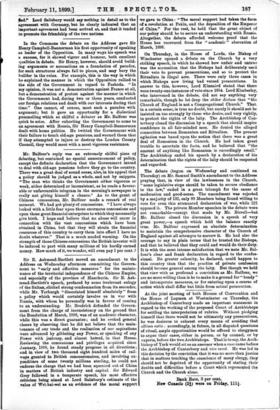The debate (begun on Wednesday and continued on Thursday) on
Mr. Samuel Smith's amendment to the Address praying that, in view of the lawlessness in the Church, .6 some legislative steps should be taken to secure obedience to the law," ended in a great triumph for the cause of moderation and good-sense. The amendment was rejected by a majority of 132, only 89 Members being found willing to vote for even this attenuated declaration of war, while 221 opposed it. The private Member speeches in the debate were not remarkable—except that made by Mr. Birrell—but Mr. Balfour closed the discussion in a speech of very great power,—a speech which held the balance exactly true. Mr. Balfour expressed an absolute determination to maintain the comprehensive character of the Church of England against all attempts to narrow it. He had also the courage to say in plain terms that he trusted the Bishops, and that he believed that they could and would do their duty. It is with the most intense satisfaction that we note Mr. Bal- four's clear and frank declaration in regard to the confes- sional. No greater calamity, he declared, could happen to this country than that the practice of private confession should become general among the laity. But though we hold that view with as profound a conviction as Mr. Balfour, we are no more willing than is he to make it a ground for " heady " and intemperate measures, or for entering upon a course of action which shall differ but little from actual persecution.






































 Previous page
Previous page